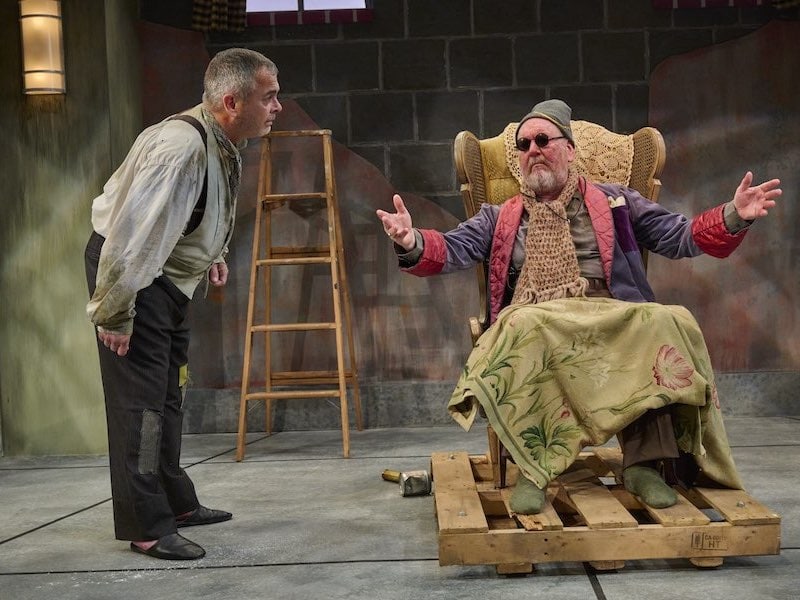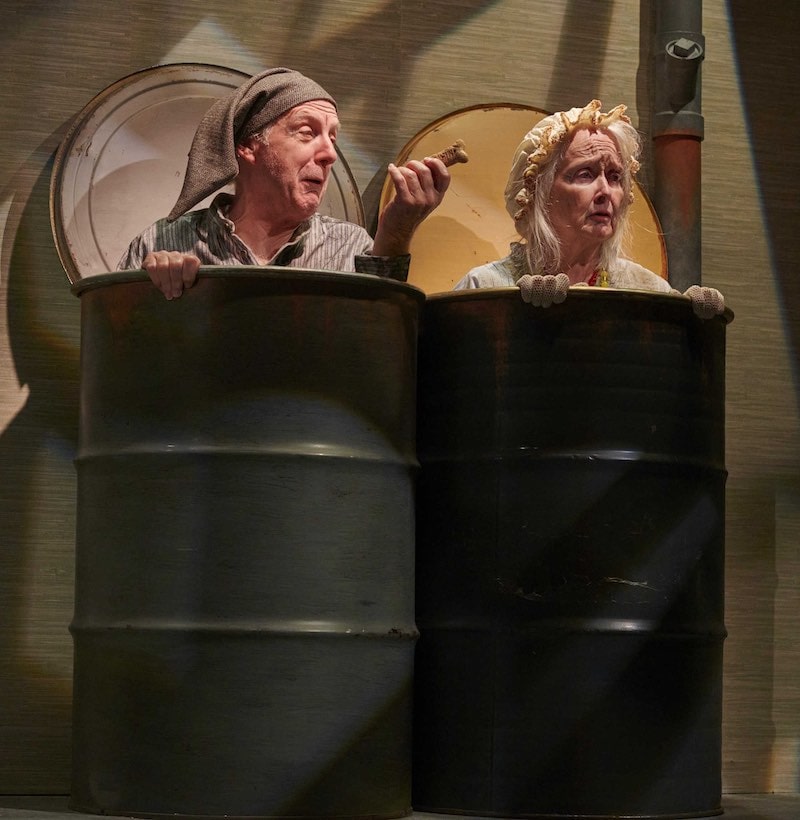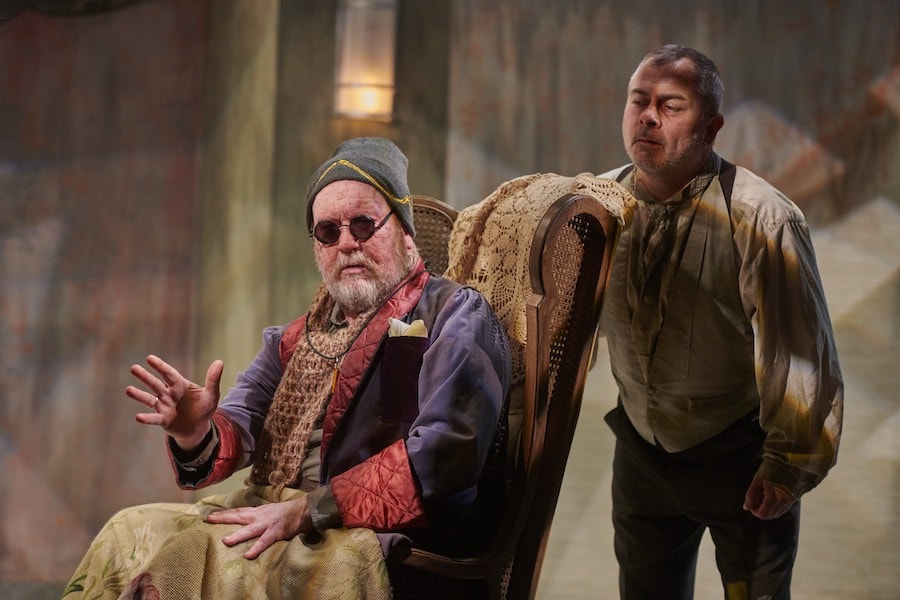You have to hand it to Samuel Beckett for blunt honesty. He once said of his play Endgame that it is “rather difficult and elliptic … more inhuman than Godot.” I thought about that strange comparison as I sat in the Undercroft Theatre awaiting what turned out to be Washington Stage Guild’s almost hypnotic humanizing of Beckett’s melancholic and existentially bleak masterpiece.
To begin with, the set is not exactly as specified — “bare interior … gray light” — and Beckett was notoriously persnickety about faithfulness to his scripts. The single room (designed by Joseph B. Musumeci Jr.) fittingly conveyed decay and isolation; it was surrounded by grim green-gray surfaces like a dilapidated cell. But what was that warmly lit hallway stage right? To what better place might it lead? And what were those three warm lighting fixtures mounted on the wall? A touch of … domestic decor? Surely Beckett would have looked askance at the sconces.

The production begins in blackout with an unscripted ticking clock (sound design by Marcus Darnley), ominously introducing Endgame’s end-of-life, end-of-the-world theme. As the stage is washed in more disarming warmth (lighting design by Marianne Meadows), we meet Hamm, the central character, who is blind and confined to a chair mounted on a wooden pallet with castors because he cannot stand and is otherwise immobile. The rose-colored lapels on his lounge jacket (costume design by Stephanie Parks) contrast brightly with the pond-scum palette overall and suggest a life once more well-heeled and privileged.
Shortly we meet Clov, who waits on Hamm hand and foot, is unable to sit, anxiously shuffles about stooped over, episodically laughs incongruously, and maneuvers Hamm’s chair around on demand. Their relationship as written is an unnerving codependency between a valueless and bossy old man and an obsequious somewhat younger man who years before was taken in as a boy.
I know. Creepy. Not to mention, stage left are two trash cans in which Hamm has deposited his barely living parents, Nagg and Nell.

What the director Alan Wade has done with this nihilistic fable about meaninglessness and mortality — albeit relieved by quite a bit of wit and humor — is remarkable. In casting Bill Largess as Hamm and Matty Griffiths as Clov, Wade has enabled a unique scene-partner chemistry that is a pleasure (not a word in Beckett’s vocabulary) to behold. As written, the play’s language can come off like verbal wallpaper — cryptic, staccato, repetitive, without context — inviting automaton enunciation. Largess and Griffiths never tumble into that trap. Instead, each finds (or invents) in each line some semblance of human emotion that is recognizable and relatable even if its literal sense is obscure. As performed, their two characters have a credible long-term relationship. Dominant and submissive as it obviously is, we don’t learn much more about what it actually is, but we are never in doubt that Largess and Griffiths are in cahoots as actors and completely get it.
HAMM: Why do you stay with me?
CLOV: Why do you keep me?
HAMM: There’s no one else.
CLOV: There’s nowhere else.
(Pause.)
HAMM: You’re leaving me all the same.
CLOV: I’m trying.
HAMM: You don’t love me.
CLOV: No.
HAMM: You loved me once.
CLOV: Once!
David Bryan Jackson as Hamm’s father Nagg and Rosemary Regan as Hamm’s mother Nell make only brief appearances and do very well too but don’t have as much to work with — they speak not to each other, always straight ahead, and relate only once, in an awkwardly failed attempt at a kiss. “Nothing is funnier than unhappiness,” Nell says at one point. Mostly the haunting presence of Nagg and Nell in the play raises a never-answered question about how they got kept in trash bins in the first place.
That Hamm character. He’s a piece of work.

Endgame is a challenging play, often absurd and nonsensical but just as often reflective of a human-all-too-human encounter with an emptiness that aims to have universality. But what if the author’s standpoint is actually not universal? What if now when more and more stories are being told on stage by global-majority, multi-gendered artists, Endgame necessarily plays differently than it did when first produced in 1957? Importantly, what if in today’s quickened cultural context, Endgame’s hegemonic Eurocentric point of view can now be seen clearly for what it is — a dom-sub, solipsistic, cis-male prison?
In warmly illuminating that way of seeing, the Stage Guild has made a masterpiece of its own.
Running Time: 90 minutes, no intermission.
Endgame plays through February 19, 2023, presented by Washington Stage Guild performing in The Undercroft Theatre at Mount Vernon Place United Methodist Church, 900 Massachusetts Avenue NW, Washington, DC. Tickets ($50–$60, with half off for students and $10 off for seniors) can be purchased online.
COVID Safety: All patrons must wear masks at all times while in the theater. Washington Stage Guild’s complete Health and Safety Policy is here.
Endgame by Samuel Beckett
Directed by Alan Wade
Cast
Hamm – Bill Largess
Hamm Alternate – R. Scott Williams (1/28, 2/4, 2//11, 2/18 at 8 pm)
Clov – Matty Griffiths
Nagg – David Bryan Jackson
Nell – Rosemary Regan
Crew
Joseph B. Musumeci, Jr., Set Designer
Marianne Meadows, Lighting Designer
Stephanie Parks, Costume Designer
Marcus Darnley, Sound Designer




